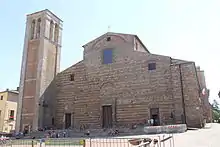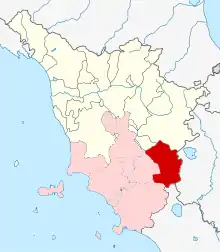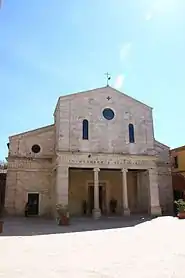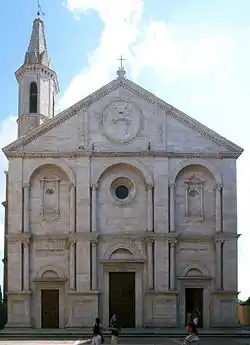Roman Catholic Diocese of Montepulciano-Chiusi-Pienza
The Italian Catholic Diocese of Montepulciano-Chiusi-Pienza (Latin: Dioecesis Montis Politiani-Clusina-Pientina), in Tuscany, has existed in the current form since 1986. In that year the diocese of Chiusi-Pienza was united into the historical Diocese of Montepulciano. The diocese is a suffragan of the Archdiocese of Siena-Colle di Val d'Elsa-Montalcino.[1]
Diocese of Montepulciano-Chiusi-Pienza Dioecesis Montis Politiani-Clusina-Pientina | |
|---|---|
 Montepulciano Cathedral | |
| Location | |
| Country | Italy |
| Ecclesiastical province | Siena-Colle di Val d'Elsa-Montalcino |
| Statistics | |
| Area | 1,068 km2 (412 sq mi) |
| Population - Total - Catholics (including non-members) | (as of 2004) 73,100 70,100 (95.9%) |
| Parishes | 46 |
| Information | |
| Denomination | Catholic Church |
| Rite | Roman Rite |
| Established | 10 November 1561 |
| Cathedral | Cattedrale di S. Maria Assunta (Montepulciano) |
| Co-cathedral | Concattedrale di S. Secondiano (Chius) Concattedrale di Maria SS. Assunta (Pienza) |
| Current leadership | |
| Pope | Francis |
| Bishop | Stefano Manetti |
| Map | |
 | |
| Website | |
| www.montepulcianochiusipienza.it | |
On March 25, 2000, Rodolfo Cetoloni was appointed bishop of the Roman Catholic Diocese of Chiusi-Pienza-Montepulciano by the Pope John Paul II, receiving episcopal ordination on May 20, 2000. On Tuesday, May 28, 2013, Pope Francis appointed Cetoloni as bishop of the Roman Catholic Diocese of Grosseto.[2][3]
History
Montepulciano belonged originally to the diocese of Arezzo, and had a collegiate church, whose archpriest became a mitred abbot in 1400; in 1480 it became a prælatura nullius, and in 1561 was made an episcopal see.
Its first bishop was Spinello Benci (1562); among the others were:
- Talento de' Talenti (1640), a savant;
- Antonio Cervini (1663);
- Pietro Francesi (1737) opposed the novelties of the Council of Florence in 1787;
- Pellegrino Maria Carletti (1802), author of several works and of eighteen letters on the National Council of Paris of 1810, which he attended.[4]
On 18 February 1984, the Vatican and the Italian State signed a new and revised concordat. Based on the revisions, a set of Normae was issued on 15 November 1984, which was accompanied in the next year, on 3 June 1985, by enabling legislation. According to the agreement, the practice of having one bishop govern two separate dioceses at the same time, aeque personaliter, was abolished. This applied to the diocese of Chiusi e Pienza. Instead, the Vatican continued consultations which had begun under Pope John XXIII for the merging of small dioceses, especially those with personnel and financial problems, into one combined diocese. On 30 September 1986, Pope John Paul II ordered that the dioceses of Montepulciano, Chiusi and Pienza be merged into one diocese with one bishop, with the Latin title Dioecesis Montis Politiani-Clusina-Pientina. The seat of the diocese was to be in Moontepulciano, and was to serve as the cathedral of the merged diocese. The cathedrals in Chiusi and Pienza were to become co-cathedrals, and the cathedral Chapters were each to be a Capitulum Concathedralis. There was to be only one diocesan Tribunal, in Montepulciano, and likewise one seminary, one College of Consultors, and one Priests' Council. The territory of the new diocese was to include the territory of the former dioceses of Chiusi and Pienza, and was suffragan to the archdiocese of Siena.[5]
Notes
- Catholic Hierarchy page
- "Archived copy". Archived from the original on 2013-06-07. Retrieved 2013-05-31.CS1 maint: archived copy as title (link)
- http://press.vatican.va/content/salastampa/en/bollettino/pubblico/2014/01/31/0074/00153.html
- Catholic Encyclopedia article
- Acta Apostolicae Sedis 79 (Città del Vaticano 1987), pp. 750-752.
![]() This article incorporates text from a publication now in the public domain: Herbermann, Charles, ed. (1913). Catholic Encyclopedia. New York: Robert Appleton Company. Missing or empty
This article incorporates text from a publication now in the public domain: Herbermann, Charles, ed. (1913). Catholic Encyclopedia. New York: Robert Appleton Company. Missing or empty |title= (help)

